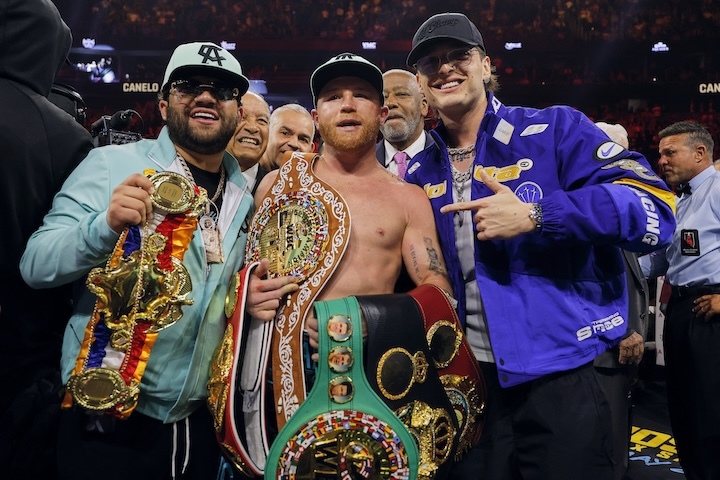Two proud champions who’ve conquered all challengers in the ring now find themselves sucker punched by the petty requirements of retaining their belts.
On Tuesday’s episode of ProBox TV’s “Deep Waters,” Canelo Alvarez’s expected relinquishing of his IBF super-middleweight belt and heavyweight champion Oleksandr Usyk’s interest in preserving his status as undisputed champion were discussed.
“Too much of anything is not good for you. And too many belts is not good for the sport,” veteran trainer Teddy Atlas said.
Mexico’s Alvarez has successfully defended his status as the first undisputed super-middleweight champion of the four-belt era a record four times, but the IBF is now enforcing that if he doesn’t agree by next week to a fight with its No. 1 contender, little-known Willam Scull of Cuba, the belt can be taken away.
Alvarez’s disinterest in fighting Scull – when he has far more attractive and lucrative offers within reach – has convinced him to vacate the belt and walk away from the undisputed mantra.
“In boxing, you can become bigger than a belt,” former welterweight champion Paulie Malignaggi said on “Deep Waters.”
“Boxing has created a standard that’s kind of slimy. If you’re a big enough deal, the championships don’t matter.”
Atlas railed against the process of rankings by sanctioning bodies.
In the case of the WBC, for instance, it won’t rank other sanctioning body champions in its rankings even though those fighters are clearly superior to those on the list.
And while the IBF has been attentive to enforcing mandatory requirements upon its champions following its involvement in a 2000 bribery trial, the process of rising through the ratings has been manipulated by a slew of dubious challengers.
Scull (22-0, 9 KOs), for instance, last fought on the pre-pay-per-view portion of Alvarez’s May 4 title defense against Jaime Munguia.
It’s no wonder Alvarez would rather consider a date with Brooklyn’s WBA mandatory Edgar Berlanga in New York, or a bout proposed by Saudi Arabia’s Turki Alalshikh against possible four-division champion Terence Crawford by early 2025.
“It’s like what they say about seeing sausage made: If you saw the process of how someone becomes a No. 1 contender – with some of them – it’s all politics,” Atlas said. “It wasn’t earning your way through it. It’s through politics.”
Former 140-pound champion Chris Algieri said the attention to mandatories by elite champions is archaic, recalling the last undisputed champion who was intent on defending all his belts was Bernard Hopkins.
As for Usyk (22-0, 14 KOs), he has requested an exception to the IBF demand that he meet mandatory No. 1 contender Filip Hrgovic next.
While IBF bylaws restrict a champion from making a two-fight deal when a mandatory is due, Usyk will honor his rematch against recent WBC champion Tyson Fury on Dec. 21 in Saudi Arabia.
Hrgovic fights England’s Daniel Dubois Saturday in Saudi Arabia and is positioning for a showdown with England’s former three-belt champion Anthony Joshua in September at Wembley Stadium. Bringing title stakes to that bout would make it all the more consequential.
“On the way up, to get authenticated and verification – to get your due – it’s nice to have a belt,” Atlas said. “After that, so long belts! It’s (then) all about how you do in the ring and how you promote yourself.”
Atlas said the Hrgovic-Dubois winner will either fight for a title or be “on deck” for a title shot.
“Hrgovic has spent two years on deck,” Algieri argued.
“You are losing time,” Atlas agreed. “It’s prime years. It’s not fair. But it’s also not fair on Usyk. He has earned the right to be an undisputed champion and he wants to keep that for more than five minutes.
“He cares about the pride that’s attached to the belts, especially for his country in war. He symbolizes the best of the best. He is the one heavyweight champion of the world, and he is from Ukraine. It goes beyond the norm.
“He’s a hard-working family guy and country is important to him. And being an undisputed champion is important.”
